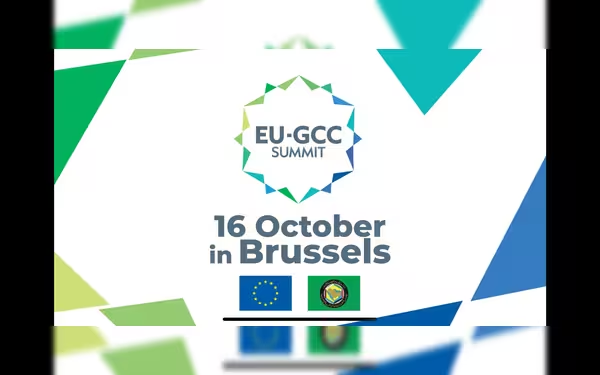Saturday, November 16, 2024 05:52 PM
EU Officials Unveil Ambitious Agenda for GCC-EU Summit
- EU outlines ambitious agenda for GCC-EU summit.
- Focus on regional stability and trade cooperation.
- Recognition of Palestine remains a complex issue.
 Image Credits: arabnewspk
Image Credits: arabnewspkEU officials present an ambitious agenda for the upcoming GCC-EU summit, focusing on regional stability, trade, and cooperation.
In a significant development, senior officials from the European Union (EU) convened a press briefing in Riyadh on Tuesday to outline the "ambitious agenda" for the upcoming Gulf Cooperation Council (GCC)-EU summit scheduled for October 16 in Brussels. This summit is poised to address critical issues such as regional stability, trade, and enhancing people-to-people cooperation between the two regions.
During the briefing, when questioned about the challenges faced by EU countries in adopting a unified stance on recognizing Palestine within the framework of a two-state solution, a senior EU official stated: "We agree on the two-state solution with the GCC, and it requires two interlocutors; the EU supports the Palestinian Authority." This statement underscores the EU's commitment to working alongside the GCC to bolster support for the Palestinian Authority.
Another official elaborated on the recognition of Palestine by EU nations, emphasizing that such recognition is a sovereign decision for each member state. While a majority of EU countries recognize Palestine as a state, some have yet to do so. This divergence highlights the complexities involved in international diplomacy.
The senior EU official further articulated that the summit's agenda is "three-fold." The first focus is on the geopolitical situation, particularly in light of the ongoing war in Ukraine and its implications for the Middle East. The official remarked, "We need to make our relationship with the GCC more strategic." The second focus is on collaborating to tackle global challenges, especially in the energy sector. Lastly, the third area of focus is on "bilateral relationships," which encompasses trade, regional agreements, and initiatives aimed at enhancing people-to-people connections.
Despite acknowledging that the EU and GCC do not always see eye-to-eye on every issue, the official expressed optimism about the potential for productive negotiations, stating, "With our 27 member states, I believe we can achieve good work." The official also highlighted the shared language and collaborative efforts within the United Nations, reinforcing the commitment to continued dialogue.
As the summit approaches, EU officials have reiterated that it will feature "a very ambitious agenda." Beyond the immediate concerns of regional stability, the summit aims to foster increased cooperation in various sectors, including trade and investment, green and digital transitions, energy, education, research and innovation, and digital infrastructure. The goal is to strengthen ties and promote mutual understanding between the EU and GCC nations.
While the specific attendees of the summit have not been disclosed, an EU official confirmed a "high level of attendance on both sides," indicating the importance of this meeting. The official also remarked on the shared concerns regarding global geopolitical challenges, stating, "Our concerns about the region are shared, and the security of the region is our security, and vice versa."
Reflecting on the historical ties between the GCC and the EU, a senior official noted the significant progress made over the past five years, stating, "Five years ago, the EU had only two delegations in the Gulf; today, it has four." This evolution signifies a growing recognition of the importance of political dialogue and cooperation between the two regions.
The upcoming GCC-EU summit represents a pivotal moment for both regions as they seek to navigate complex geopolitical landscapes and enhance their collaborative efforts. As global challenges continue to evolve, the commitment to dialogue and cooperation will be essential in fostering stability and prosperity for all involved.













